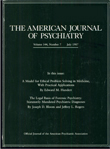Sleep reduction as a final common pathway in the genesis of mania [published erratum appears in Am J Psychiatry 1987 Apr;144(4):542]
Abstract
Diverse psychological, interpersonal, environmental, and pharmacological factors that appear to trigger the onset of mania could act via their capacity to cause sleep deprivation, a mechanism that has been shown in experiments with bipolar patients to induce transient or sustained switches into mania. Since mania in turn causes insomnia, the development of mania is potentially self-reinforcing and could become autonomous after being initiated by precipitating factors. The sleep reduction model is based on experimental evidence and is a parsimonious explanation for the precipitation of manic episodes by a wide variety of factors. Furthermore, this model has clear implications for the prevention and treatment of mania and provides a conceptual focus and an experimental paradigm for psychological investigations of the causes of mania.
Access content
To read the fulltext, please use one of the options below to sign in or purchase access.- Personal login
- Institutional Login
- Sign in via OpenAthens
- Register for access
-
Please login/register if you wish to pair your device and check access availability.
Not a subscriber?
PsychiatryOnline subscription options offer access to the DSM-5 library, books, journals, CME, and patient resources. This all-in-one virtual library provides psychiatrists and mental health professionals with key resources for diagnosis, treatment, research, and professional development.
Need more help? PsychiatryOnline Customer Service may be reached by emailing [email protected] or by calling 800-368-5777 (in the U.S.) or 703-907-7322 (outside the U.S.).



